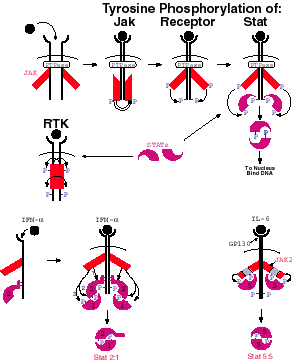Laboratory of Molecular Cell Biology
Differentiation, development and homeostasis in adult tissues depend on the execution of a correct transcriptional program in particular cells. In turn, many of the signals which cells receive and interpret to execute such programs come in large part from polypeptides that bind to the cell surface. These signalling polypeptides are active both in development and particularly in adults to maintain correct hemopoeisis condtions and to respond to outside stresses such as infections.
Our laboratory group studies how signals from the cell surface do, in
fact, affect nuclear transcription. These studies originally used as a
model ![]() and
and
![]() interferon stimulation of transcription of a limited set of genes.
interferon stimulation of transcription of a limited set of genes.
The interferons specifically call forth the transcription of a limited set of otherwise quiescent genes, and we have at least partly unraveled the mechanism of this stimulation. Latent cytoplasmic proteins termed STATs (for Signal Transducers and Activators of Transcription) become active as DNA-binding factors only after interferon occupies its receptor.
We obtained molecular clones for the STAT proteins, and antisera to these proteins allowed the demonstration that interferon-dependent tyrosine phosphorylation followed by dimerization of the proteins and nuclear translocation is the basis for gene activation. We extended this pathway to include many ligands other than the interferons, discovered several other mammalian STATs as well as a Drosophila STAT that functions in early development. Over 40 polypeptide ligands are now known to activate one of the seven know STATs in mammals. Thus the pathway appears to serve a very general role in cell regulation. Among the important newer findings on the biologic front is the realization that some STATs are constitutively activated in cancer cells. The basis for the role of genes activated constitutively by STATs is under study. In addition the crystallographic structure has been determined together with John Kuriyan's group and we are intensely studying the functional domains of STAT proteins biochemically and structurally. Finally, the proteins responsible for steps in the activation-inactivation cycle are becoming known and this is also being studied.
Research group classification: Molecular, Cell and Developmental Biology
Key words: transcriptional control/cytokines/signal transduction/STAT proteins

